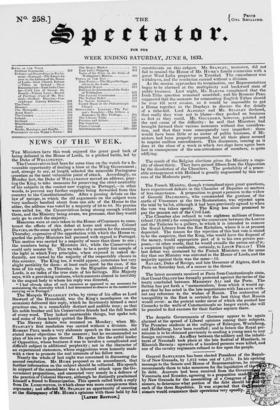NEWS OF THE WEEK.
'THE Ministers have this week enjoyed the great good luck of being defeated in the House of Lords, in a pitched battle, led by the Duke of WELLINGTON.
The Conservatives had been for some time on the watch for a favourable opportunity of (Icahng a blow at the Whig Government ; and, strange to say, at length selected the miserable Portuguese 'question as the most vulnerable point of attack. Accordingly, on Monday last, the Duke of WELLINGTON moved an address, pray ing the King to take measures for preserving the strict neutrality of his subjects in the contest now waging in Portugal,—in other -words, to prevent any further supplies being forwarded from this -country to the Constitutionalists. After a prosing debate on the law of natinns, in which the old arguments on the subject were .very uselessly bandied about from one side of the House to the other, the address was voted by a majority of 80 to 68. No proxies were called for, the Conservatives being strong enough without them, and the Ministry being aware, we presume, that they would only go to swell the majority.
Measures were at once taken in the House ofCommons to coun
teract the effects of this defeat at home and abroad. Colonel DAVIES,on the same night, gave notice of a motion for the ensuing Thursday„ expressive of the approbation with which the House regarded the policy Ministers had pursued with regard to Portugal. This motion was carried by a majority of more than three to one ; the numbers being for Ministers 361, while the Conservatives could only muster 98. This we take to be a pretty fair sample of the light in which Tory principles, when exposed in naked deformity, are viewed by the majority of the respectable classes in this country. The King too, it would appear, entertains but very slight partiality for them : at least such must be the case, if the tone of his reply, on Thursday, to the Miguelite address of the Lords, is an index of the true state of his feelings. His Majesty says, with a provoking coolness, which amounts almost to incivility to the august body to whom his reply was directed, " I had already taken all such measures as appeared to me necessary for maintaining the neutrality which I had determined to observe in the contest now i
carrying on n Portugal."
The Marquis WELLESLEY (who, by virtue of his office as Lord Steward of the Household, was the King's mouthpiece on the occasion) delivered this reply, which he facetiously termed a most gracious one, in a remarkably distinct and audible tone; so that his noble brother and his Conservative friends had the full benefit of every word. They looked unutterable things, but spake not, and some of them hastily quitted the House.
The Slavery debate was resumed on Monday; when Mr.
STANLEY'S first resolution was carried without a division. Sir ROBERT PEEL made a very elaborate speech on the occasion, and stated many objections to the measure ; but he recommended no plan of his own in place thereof. He spoke like the artful leader of Opposition, whose business it was to involve a complicated and difficult subject in additional perplexity; not in the character of an experienced statesman, whose suggestions were honestly made with a view to promote the real interests of his fellow men.
Nearly the whole of last night was consumed in discussing the
second resolution. Mr. HUME proposed as an amendment, that further information on the subject should be collected. His speech in support of the amendment was a laboured attack upon the Government propositions, and amounted very nearly to a defence of the practice of Colonial Slavery, although lie distinctly proclaimed himself a friend to Emancipation. This speech called forth a reply from Dr. LUSHINGTON, in which abuse was more conspicuous than argument; and afforded Mr. STANLEY an opportunity of sneering at the dininsepancy of Mr. numa's opinions with those held by his
[LATEST EDITION.)
constituents on this subject. Mr. STANLEY, moreover, did not fail to remind the House of Mr. HUME'S family connexion with a great West India proprietor in Trinidad. The amendment was withdrawn, and the resolution carried without a division.
As the session approaches its termination, our Representatives begin to be alarmed at the multiplicity and backward state of public business. Last night, Mr. BARING complained that the Irish Tithe question remained unsettled; and Sir ROBERT PEEL suggested that the measure for commuting English Tithes should lie over till next session, as it would be impossible to get a House together in the Dog,days to discuss the dry details of a tithe-bill. Lord ALTHORP and Mr. STANLEY declared, that really they were not to blame—they pushed on business as fast as they could. Mr. GOULBURN, however, pointed out the real cause of the difficulty: he said that Ministers had brought forward their various measures without due consideration, and that they were consequently very imperfect : there would have been little or no arrear of public business, if Ministers had been properly prepared, but all their plans seemed to require endless amendments. This discussion, coming as it does at the close of a week in which two days have again been lost in consequence of the non-attendance of members, is quite edifying.


















